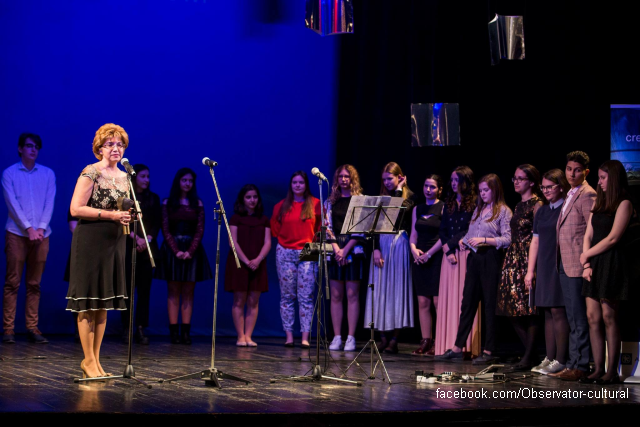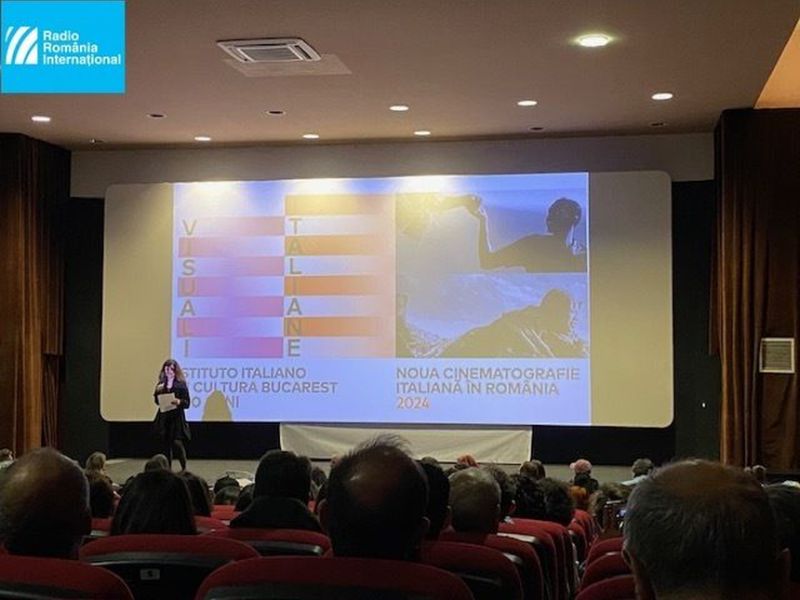The Observator Cultural Awards Gala
The 13th edition of the Observator Cultural Awards Gala was held on April 9 at the Odeon Theatre in Bucharest.

Corina Sabău, 04.05.2019, 14:12
The 13th edition of the
Observator Cultural Awards Gala was held on April 9 at the Odeon Theatre in
Bucharest. On this occasion we talked to Ovidiu Simonca, deputy editor in chief
with the Observator Cultural magazine, about the latest edition of the gala and
contemporary Romanian literature. One of the novelties this year is Observator
Universitas, an award bestowed by students of philology faculties to a volume
of poetry. The starting point for the discussion was the Observator Lyceum
award, which has reached its fourth edition, bestowed by students from the I.L
Caragiale, George Cosbuc, Iulia Hasdeu, Gheorghe Lazar, Mihai Viteazul, Sf.
Sava, Gheorghe Sincai and Tudor Vianu high schools in Bucharest. Observator
Lyceum is a project started in 2016 by the Observator Cultural magazine, with
support from the National Museum of Romanian Literature, similar to the
prestigious French award Prix Goncourt des Lyceens. The purpose of the project
is to create a communication platform between contemporary Romanian writers and
the young readership, in an attempt to bring the latter closer to Romanian
literature and encourage them to read more. Ovidiu Simonca.
It was a very interesting
experience, the students who made up the jury came to our office and together
we talked about all the books nominated in the fiction award. I’m glad these
young people will become future critics and professional readers of Romanian
literature. We should say the students who bestowed the Observator Lyceum award
are coordinated by an exceptional teacher, who encourages them to read
contemporary literature. As regards the novelty of this year’s edition of the
Observator Cultural Awards Gala, the Observator Universitas award, we had
students from the philology sections of the University of Bucharest, the
Babes-Bolyai University in Cluj, the Alexandru Ioan Cuza University in Iasi and
the Lucian Blaga University in Sibiu who selected a poetry volume from the
shortlist. So the readership is there, the future of Romanian literature is
secure and the books are there as well. The only problem is we need to be more
visible at international level.
The Observator Lyceum award was
given to Cristina Andrei for her volume Matriarchate,
released by Nemira Publishers. The Observator Universitas award was bestowed to
Robert Gabriel Elekes for the volume A
Drone Just for Me, published by Max Blecher Publishing House. We talked to
Ovidiu Simonca about the publishers’ growing propensity for Romanian
literature:
I want to say the decision of
Humanitas Publishers to publish more Romanian literature books was very
inspired. Writer Andreea Rasuceanu, the coordinator of Romanian Writers collection,
selected good titles last year and continues to publish high-quality
literature. At any rate, the competition between Humanitas, Nemira and Polirom
publishers in this respect is most welcome, it means publishers are relying on
Romanian literature more and more. Based on the books released so far, I
believe we will have a very good year, with lots of books bought and discussed.
In fact, 2018 was good year as well in that respect.
Romanian literature is increasingly
diverse, and readers and publishers alike appreciate it more and more. Yet the
important thing is to promote and translate it, Ovidiu Simonca believes. In
other words, Romanian publishers need to get involved more to find professional
translators of Romanian literature. It is the only way we can make a difference
at international level, Ovidiu Simonca believes:
In recent years we had translations
of Romanian works in German and Spanish, which were very well received by
international critics. And I refer to the volume Lost Morning, translated in
German by Eva Ruth Wemme and published by Aufbau publishers, and the success of
Mircea Cartarescu’s volumes Orbitor and Solenoid published in Latin America
and Spain. Orbitor was actually declared Book of the Year 2017 in Spain. I would
also like to mention the success enjoyed in Germany by Nora Iuga’s books, proof
of which are the numerous eulogies her books have received. More often than
not, however, we don’t manage to reach the big publishing houses, which after
all give an author his prestige, to the extent to which that author is part of
universal literature. Before 2007, before our EU accession, there was a growing
interest for Romanian literature. It was then that the Romanian Cultural
Institute implemented a translation programme, by means of which 20 volumes
reached the big publishing houses in Europe, and Romanian authors were guests
in big book fairs, in Leipzig, London and Paris. Right now, my feeling is that
the big European publishing houses are not publishing Romanian literature, with
few exceptions.
At the 13th edition of
the Observator Cultural Awards Gala the Gheorghe Craciun award for Opera Omnia
was granted to poet, writer, playwright and translator Constantin Abaluta. The
award for fiction went to Gabriela Adamesteanu for her novel Fontana di Trevi brought out by Polirom
Publishers. The poetry award went ex
aequo to Cosmin Perta, for his volume Lullaby
for My Generation, which was brought out by Paralela 45 Publishers, as well
as to Vasile Leac’s Monoideal,
released by Nemira Publishers.





























